August 13, 2009, Thursday
Yonozu (also sometimes spelled Yonouzu) is a very small town (technically a village according to the Japanese classifications). It doesn't take very long to drive through it at all, and there's not much to do there. But wow, what a beautiful place.
I actually remember driving through part of Yonozu my first year in Japan. I didn't know it was Yonozu at the time. We were just going down to a JET welcome party in Kamae, and it was one of the towns we drove through to get there. I remember being astonished by the beauty of the area, and it has always been on my mind to return someday. In fact, that memory is probably one of the biggest reasons I started this whole project--so I could be sure I thoroughly explored every scenic area Oita prefecture has to offer.
Yonozu is along the coast, just south of Saiki and Tsurumi (for Tsurumi see previous post).
I drove in and stopped at the town hall to pick up what little information I could about Yonozu.
The town hall, like most of the village, is located right on the ocean, so I walked along the edge a bit.
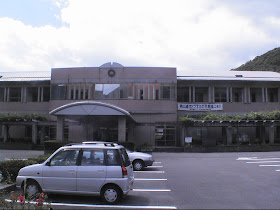


I got back and my car and did some driving. I tried to go north along the Tsurusaki peninsula, but the rain road petered out fairly quickly, forcing me to turn around and go back.
I made a brief stop at Awashima Jinja, one of the sights indicated on map.


Next I drove south along the coast road.
I saw signs pointing towards "Sora no Koen" (sky park), and I followed the road up into the mountains to see it.
Before I got to the actual Sky Park, there was a scenic overlook halfway up the mountain, which I turned off the road to see.
I was absolutely blown away by this. The bright blue ocean was laid out before me against the green mountains and various islands. The sun was just right to bring out all the colors.
I took picture after picture trying to capture the beauty of the scene. Each time I looked at what I had photographed, I thought, "no, that isn't right," and I would take another picture.
This is one of those views that just has to be experienced in person. Seeing this all laid out before you in all directions simply can not be captured on a little square picture frame.
It was, if not the best view I have ever seen in my whole life, at least the best view I have seen in quite some time. And I'm sorry I wasn't able capture it better on film.











I didn't want to leave this spot, and spent a lot of time here just looking out, and then reading my book under the pavillion they had set up. But eventually the thought that there might be other views like this caused me to move on.
I drove up to the rest of sky park, and parked my car in the main parking lot.
Sky park was a little park built on the top of the mountain, consisting of a main picnic area and then several small trails leading to other look out points.







All of these different look outs showed the ocean from a slightly different angle, but none of them blew me away the same way as the first view had. (Perhaps that first view had blown some sort of fuse in my brain, and nothing else could compete with it).






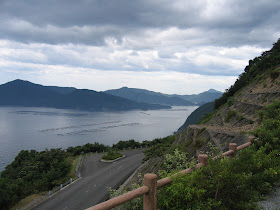

I started out hiking up a small hill, which lead to the first look out point. It was actually a big antenna, but they had a small platform at the base.
Again, this wasn't as good a view as the first stop, but it was actually a broader view. I could see more of the ocean and much more of the port.
From here a trail led down the mountain a ways to Zizoson shrine (which I was later told is used to pray for safety at sea.) There was another raised platform here from which I could see the ocean.
Back up the way I had come. There was another little parking lot here from which I got another view at a slightly different angle.
And, I returned to the main sky park.
I crossed the road to look at some more of the park and a map.
There was a teenage girl there who was looking at me very intently. "Konnichiwa" she called out.
"Konnichiwa," I answered. And, because she was looking at me so intently, I felt obliged to add, "Ogenki desu ka?" (How are you?).
She responded that she was fine, and then she added (also in Japanese), "It sure is hot out today, isn't it?"
"It certainly is," I responded.
I turned to study the map, and ended our conversation. But she ran up the hill to where her family was, and I could hear her eagerly reporting every word of our encounter. "I ran into a foreigner, and I said hello, and he said hello back, and then he asked me how I was, and I said it was hot out..."
"Well where is he?" I heard the grandfather respond. "Invite him over here."
I then heard indistinct yelling, which I assumed was an invitation, so I approached. "Come over, come over," the old man was saying. "Have some food with us. Have you eaten lunch yet?"
"Just a calorie mate" (Japanese energy bar) "I got at the convenience store," I said.
"Sit down, have some rice balls."
So I sat, and they gave me rice, and tea, and plenty of Japanese vegetables, and encouraged me to eat up.
There was rice wrapped in squid, and some sort of fried fish. I did my best to eat everything they served me while I made conversation with them.
The old man and woman had spent their whole lives in Yonozu. The mother and her two teenage kids had moved to Osaka, but they had returned to Yonozu for the Obon Holidays.
"Which is better, Yonozu or Osaka?" I asked, half as a joke.
"Oh, Yonozu is much better," the mother said. "It's so beautiful and peaceful, and the people are so friendly here."
"She's very fond of Yonozu because it's her hometown," the grandmother explained. "Japanese people are like that. Where ever they go, they always love their hometown the best."
"I only moved to Osaka because I got married," the mother explained.
There was one other child with them, a cousin perhaps, who was currently living in Yonozu. Given that this town was so remote and out in the mountains, I was curious if they had a foreign ALT (W) who made it out here. I asked her about it, and she said there was an ALT who came out about twice a week.
I asked some other questions about Yonozu, and the family indicated the grandmother. "She was on TV recently," they said. "Do you know the TV program, "Inaka ni tomarou?"
"I've heard about it," I answered. Although I've never actually sat through an episode, it's a well-known program in Japan and I've heard many descriptions of it. Apparently the premise is that famous television celebrites from the big cities go out to the countryside to explore and try and find a place to spend the night. Most of the time the old people in the countryside don't even know who these famous celebrities are. Everyone then has a good laugh at how backwards and out of touch the old country bumbkins are.
"Recently they did a program on Yonozu," the mother said. She mentioned the name of the celebrity who came down there, but I neglected to write it down at the time and now I can't remember who it was. It was someone I had never heard of, and the grandmother had never heard of him either. But he had come down with the TV cameras, and the grandmother had been shown on TV playing gateball (W)."
"Then there was another program they did about Yonozu on 'Darts Tour'. Do you know 'Darts Tour'?"
I did not.
"They have a big map of Japan, and they throw darts at it. And where ever the darts land they have to travel to. One of the times they came to Yonozu."
We talked some more. They gave me a lot more food, which I gratefully ate. I talked to the kids and asked them questions about their school, what they liked to study, and what they wanted to be in the future. (In other words, all the usual questions adults always ask kids. I always hated these questions when I was a teen-ager, but it certainly is the most obvious course of conversation whenever you can't think of anything else to say.)
At one point I got out my map of Yonozu, and thought I would ask them some questions about it. I thought this would be a nice little conversation that would allow them to tell me more about their town, but it turned out to be a mistake.
First of all, I pointed to various things on the map that I couldn't read, and asked them to teach me the reading of the Kanji. They didn't know, and so they argued with eachother over some of these.
(Especially when it comes to proper names, Japanese people themselves often don't know who to read the Kanji. It's one of the most frustrating things about the langauge.)
Then, I asked them where would be a good place to go swimmming. And this simple question also led to a lot of debate.
"You can't go swimming anywhere," the grandmother advised me. "It's dangerous. There are a lot of jellyfish and dolphins in the water."
The grandchildren and I both had the same question. "Dolphins are a problem?"
"Well, no dolphins don't do anything bad. I'm just saying that they're out there. And you have to watch out for the jellyfish. So you need to go swimming at a designated area."
"There's a Hazako swimming beach up near the Tsurizaki peninsula," said the grandfather.
"Yes, but you can't get there from here," the mother said. "You'd have to go around all these mountains. It would take too long. It's better to go down here to Kamae town if you want to go swimming."
They went back and forth on this for quite some time until I was sorry I had asked. Eventually I told them I would go up and check out Hazako beach. (I'm planning on saving Kamae town for another day).
We said good-bye to eachother, and I got in my car and headed towards Hazako beach.
Hazako beach was advertised on my little town map as a very scenic place to go swimming. It was up on the Tsuruzaki penninsula, but because the southern coast of the Tsuruzaki penninsula was entirely made up of cliffs and mountains there was no road going there through Yonozu. Instead I had to drive up into back up into Tsurumi, and retrace the coastal road there that I had done a couple days ago (see previous post). Then eventually there was an overpass through the mountains that led me back to the southern side of the peninsula, and back into Yonozu village.
I thought this was a very odd way to draw town boundaries. Technically Yonozu may look like one continous area when drawn on a map, but to get to the northern edge of it you have to go leave the town and go through Tsurumi.
I imagine the people up in Hazako must feel like they're more a part of Tsurumi town than Yonozu. And yet in the old days they probably had to do all their paperwork through the Yonozu town hall.
(Since the town mergers, it probably doesn't matter much anymore. All of these smaller towns and villages have now merged together with Saiki city).
Driving over the mountains, there was a scenic look out spot where I got a great view of Hazoko beach down below.
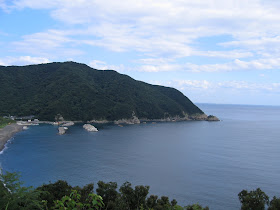
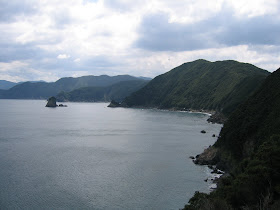



Just behind the beach was a small shrine in front of a pond. I parked my car and wandered around here for a while.







After I had explored the pond, I went to Hazako beach.
Half of this beach was very scenic, the other half was an old beat up port.
(The tourist map had been very clever in cropping its shot. They only showed the scenic half of the beach--3 beautiful woman frolicking in the waves with the green cliffs in the background. The rusted boats and big concrete tetrapods were no where to be seen).
Nevertheless, if you concentrated on the scenic half of the beach, it was absolutely gorgeous.
I drove down, parked my car, and walked around to take some pictures and video.
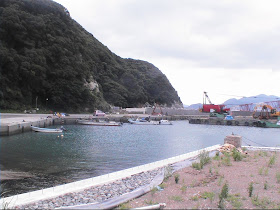



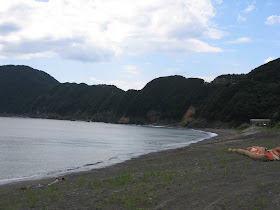
While I was taking this video, 3 girls called out to me. "Hello! Hello!"
I walked down, and there were 3 very beautiful (if a little overly made up) young women. The pamphlet had promised there would be beautiful girls at this beach, but I didn't believe it.
And in fact their fashionable looks and heavy make up seemed very out of place in this small fishing town.
"Hello," I said to them. "Where are you from?"
We talked for a while. All 3 of them were living in Osaka now. One of them had a grandmother in Yonozu, and so they were visiting her for the week.
During Obon season, all the young people return home to the countryside for the week.
Since most JETs first arrive in Japan during Obon season, it's easy to get fooled by this. I remember thinking myself, "I don't know what everyone is complaining about, there are lots of young people in this small country town." And then suddenly they were all gone.
And sure enough, these girls were all leaving to head back to Osaka that same afternoon.
"You must be college students," I said, guessing by their apparent age.
"Yes," they answered.
"And what are you studying?"
"Make up," one of them said.
"And also nails and manicures," another one added.
That no doubt explained why they were so heavily made up.
"Isn't this great?" one of them said to the other. "We've had a little international exchange here."
And then, feeling that their need for an international exchange had been satisfied, they said their good-byes and left. (Since they were very pleasing to the eye, I would have been content to talk to them longer, although I must admit I was already running out of conversation fast. I had very little follow-up questions about the study of make-up.)
I went back to my car and put away my camera and video, took out my swimsuit and towel, changed in the bath house, and went back out for a swim.
I don't go swimming in the ocean often, but I thought the water was surprisingly cold. Since it had been so hot outside, I just assumed that the ocean water would be quite pleasant, but it was frigid.
I had to force myself to get in, but as always happens once you're in the water and moving around you don't feel so bad.
Although when I was on the land I had thought the concrete tetrapods and the port spoiled the view a bit, when I was in the water I didn't mind it at all. While swimming I could look back at the land and see all the green mountains, or I could look out to sea and watch the ocean and the various green islands.
The weather was a bit funny that day. The sky kept clouding over, and then becoming clear again. So the sun was constantly appearing and disappearing, but when it was shinning it really made everything look beautiful. (Unfortunately most of the pictures I took of this beach where during a cloudy spell. But you'll have to take my word for it that the above pictures don't do the place justice when the sun is out.)
The ocean was beautiful. From a distance it looked bright blue, but up close it was crystal clear. Even when I was out in the deep water I could see everything below me perfectly. (If I had snorkeling equipment, I imagine this would have been a perfect place to use it).
At first, aware that I was out of shape and in need of exercise, I tried to swim vigorously from pole to pole. But after a while I just relaxed and enjoyed the view.
I was in the water for over an hour before I got sick of it.
Afterwards I went back to the bath house to change again.
Like a lot of other stuff around here, the bath house had fallen into disrepair and was dirty and rusty. But the showers still worked great so I was able to wash off most of the salt water and felt fine the rest of the day.
I consulted my map again, but it looked like I had seen all the major tourist sites Yonozu had to offer. (Excluding the hiking--which I didn't feel like doing in August.)
Yonozu is a small town, and much of it is covered by inaccessible mountains. So it doesn't take long to drive through it. But it is such a beautiful area that I decided to drive back towards the town center, park the car, and just walk around the streets for a while.
Even a simple walk feels a bit stiffling in this heat, but I drank plenty of fluids, and stopped at every shaded pavilion I could find to rest and read my book. (For example, I stopped at a place called, "Sakanasan park", near the Shiifuukan (some sort of seafood restaurant).)
I walked along the colored sidewalk, named Nakayoshi sidewalk, which was tiled with various art from the local people.
There was also some sort of shrine--Tateiwa, I think, was how you say the name.



And I took lots of pictures of the ocean.
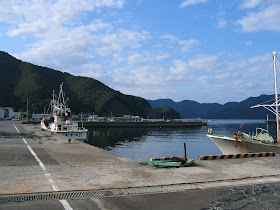

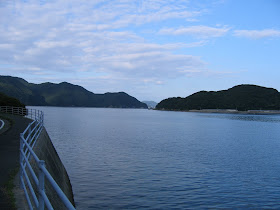



Around 6, I decided to call it a day and headed home.
Yonozu links:
Historical Materials of the Tsunamis in Yonozu Village,
Guardian of the sea: Jizo in Hawai'i (on Google-books, mentions Yonozu briefly)
Link of the Day
Chomsky on 911 Truth and JFK cults
And The Honduras coup is a sign: the radical tide can be turned (This article is really a must read).
No comments:
Post a Comment